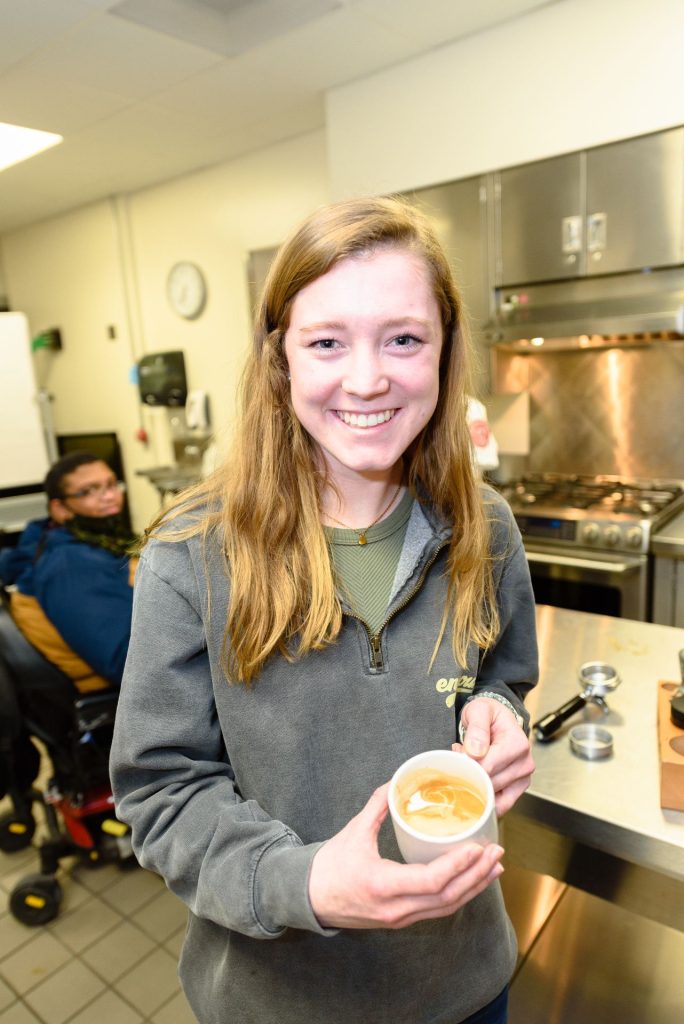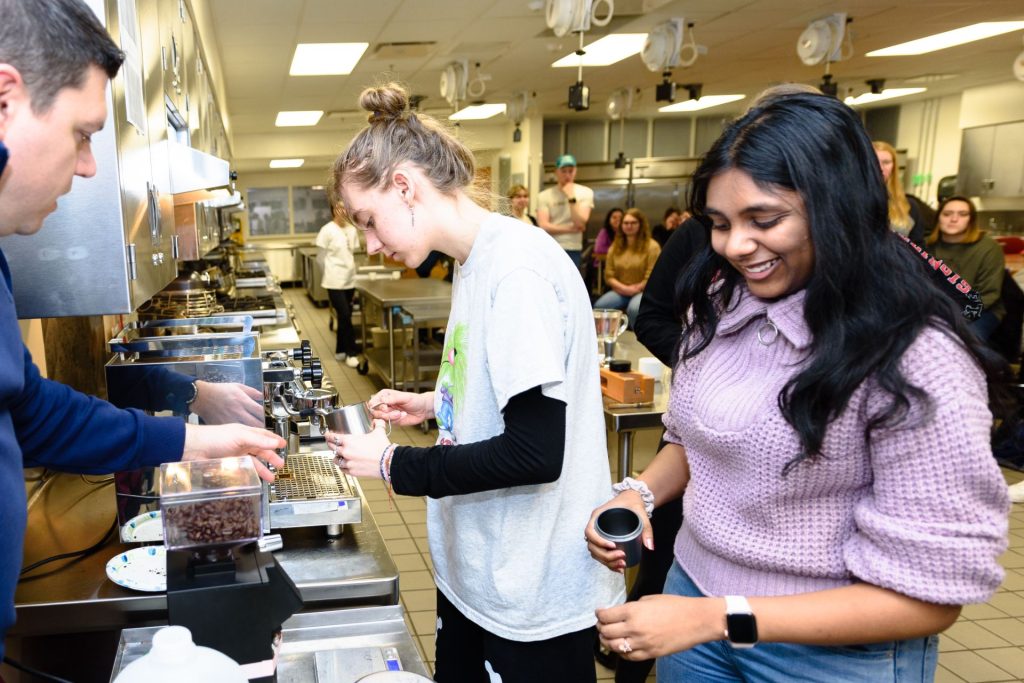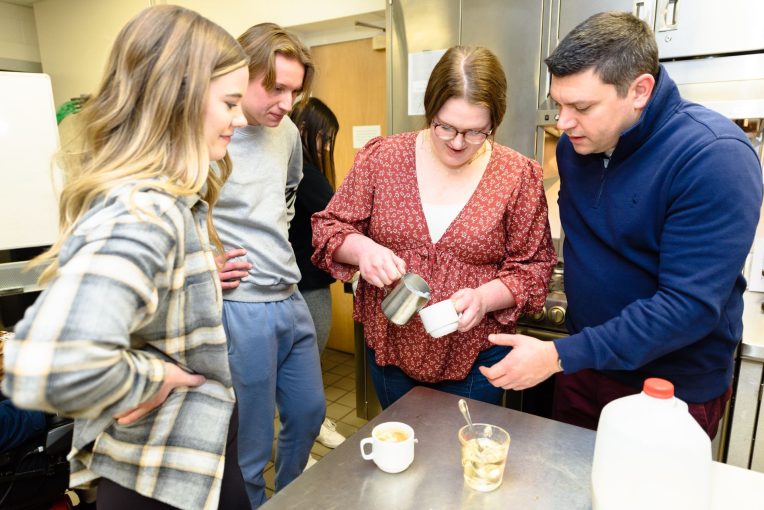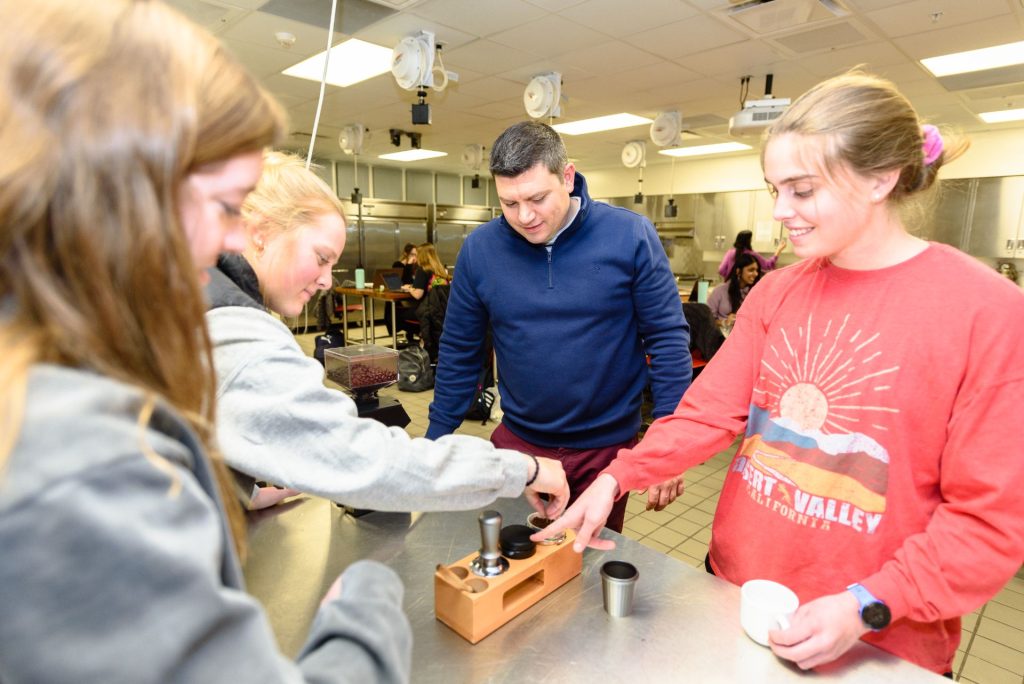Dr. Erol Sozen’s Honors Exploration began like most classes.
“And then, the sweet smell of coffee started permeating through the classroom,” said freshman nursing major Emma Paustian.
She was one of 25 students enrolled in Sozen’s five-week course “A Quick Dive into the World of Coffee,” a noncredit, discussion-based experience for Honors Program students, freshmen through seniors, from a diverse range of majors.

During an especially aromatic evening session in Turner Hall’s food laboratory, Paustian and her classmates took turns grinding freshly roasted coffee beans, precisely pulling espresso shots using an industrial espresso machine, and frothing milk.
“And then, we got to try our drinks, which was super fun,” Paustian said. “I’ve never used an espresso machine before. Obviously, that’s not something that’s super accessible if you haven’t invested time and money into it. And so, that was something I was thankful to get the opportunity to try out.”
Sozen, who fashions himself a coffee “hobbyist,” designed the Honors Exploration to provide an overview of the international coffee supply chain, to introduce the industry-specific process for evaluating coffee, and to teach techniques for making various types of coffee drinks.
“I wanted to open students’ eyes about the industry, about farmers, about sustainability, and a little bit about the different categories of coffee,” said Sozen, an assistant professor of food, nutrition, and dietetics.
Students in the course also worked in small groups to research the unique characteristics of coffee-producing regions and the environmental impacts on coffee flavors.
“I grew up with a farming family, and I really like the agricultural perspective of a lot of different things,” said freshman nursing major Sydney Walter. Her family farms 2,000 acres of corn and soybeans in northern Illinois.
“I figured that this class would be a great way to learn about the different types of coffee that are grown in different places, in different climates, and how agriculture influences the culture of coffee that we have today.”

Walter and Paustian both researched Indonesia where coffee fruit—harvested to produce coffee beans—grows in nutrient-rich volcanic soil and thrives in the tropical climate. They learned that Indonesian coffee tends to taste sweeter and is lower in acidity than coffee from some other regions.
“You could tell which coffees were more acidic than others, which ones had sweeter notes—notes of chocolate, sometimes honey, or stone fruits,” Walter said. “There were different flavors you could kind of pull out of each of the cups of coffee based on where the beans were from. No two are the same.”
Paustian, who gained a greater appreciation for a drink she loves, said coffee growers are facing challenges related to nutrient-depleted soil. She said it is important for agriculture researchers to equip farmers with sustainable solutions, such as rotating crops each year.
“Coffee is grown by small farms and cooperatives, which is awesome because you’re supporting primarily family-owned local businesses,” Paustian said. “Ultimately, it’s their livelihood, and you want them to be able to continue—and that happens through sustainable farming practices.”
Along with researching coffee-growing regions, Sozen and the class also discussed how coffee is uniquely prepared and consumed in various cultures across the globe. A native of Turkey, Sozen brought in his cezve—a small, long-handled pot with a pouring lip—used to make rich Turkish coffee.
“You need to grind Turkish coffee very, very fine,” Sozen said “It is even finer than espresso grounds. Then you add water, sugar if you want, and you boil it. It’s a very strong coffee.”
The student demand for Sozen’s Honors Exploration was so high that he agreed to teach two sections this spring. In the future, he would like to create a food and beverage management special topic course on “beverage appreciation.”
Walter and Paustian agreed that Sozen’s class has changed the way they see—and taste—coffee.
“From the bean all the way to your cup of coffee in the morning is quite a journey,” Walter said. “There’s a lot of steps in that process, and there are a lot of people involved in it.”
Honors Explorations are short-term, noncredit, discussion experiences available for honors students, which focus on unique topics and are often beyond the regular curriculum and integrate current events or pop culture. Registration for fall 2023 Honors Explorations begins April 4 at 7 a.m.


